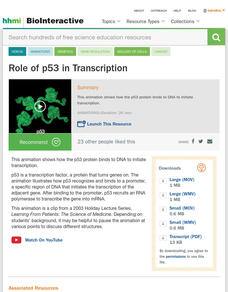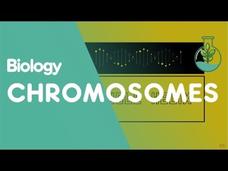Ancient Lights Media
Cell Reproduction Mitosis: the Five Phases
Cellular Reproduction Set: 3. This clip describes the events of the five phases of mitosis: prophase, pro metaphase, metaphase, anaphase and telophase.
Schooling Online Kids
Arts and Crafts: How to Make Pom Poms
Hi friends! Do you have lots of plastic bags lying around the house? We do! Even though it is important to use reusable bags, we don’t want to let these ones go to waste! Today, Bella and Pepe are making super cute pom poms out of old...
Cerebellum
The Human Body Major Systems & Organs - The Reproductive System
The human body is a wondrously complex machine made of flesh, bone, muscles, organs, blood vessels and highly specialized systems that function together to sustain life. This fascinating third part of The Human Body series examines the...
Brian McLogan
What is the negation of a statement and examples
👉 Learn how to find the negation of a statement. The negation of a statement is the opposite of the statement. It is the 'not' of a statement. If a statement is represented by p, then the negation is represented by ~p. For example, The...
Oxford Comma
Counting our Own Hours: When I Have Fears That I May Cease to Be
Because he died so young, Keats' poetry is often read biographically. Readers usually come to the consensus that his death at 25 years of age robbed the world of one of its greatest writers. And Keats certainly thought his early death...
Curated Video
Decoding Three Phoneme Words with Consonant Digraphs in a Text
In this video, the teacher explains how readers can decode three-phoneme words with consonant digraphs in a text. The steps involve locating the word, writing it down on a sticky note, segmenting each sound, and blending them back...
Espresso Media
From Building Launchpads to Breaking Barriers: A Journey through NASA's History
The video features interviews with individuals who worked on the construction of the Space Center in Florida and later worked at NASA. They discuss the challenges they faced, including segregation and discrimination, and the importance...
Grammaropolis
An Adverb Modifies an Adjective
When an adjective is hungry, all it takes is for an adverb to share his sandwich to make the adjective not hungry.
Amoeba Sisters
Chromosomes and Karyotypes
Explore chromosomes and karyotypes with the Amoeba Sisters! This video explains chromosome structure, how chromosomes are counted, why chromosomes are important, and how they can be arranged in a karyotype! This video also tackles a few...
FuseSchool
DNA Replication
CREDITS Animation & Design: Bing Rijper Narration: Dale Bennett Script: Gemma Young It might be hard to believe, but at the very start of your life you were a single, microscopic cell called a zygote. Your body now contains millions of...
FuseSchool
What Are Chromosomes
In the nucleus of each eukaryotic cell, the DNA is packaged together into chromosomes. Each chromosome is made up of DNA that is tightly coiled around proteins that give it the structure. Chromosomes usually occur in pairs, except for...
Let's Tute
Midpoint Theorem in Real Life: Hanging an LED Light at the Center of a Building
In this video, a teacher explains how the midpoint theorem in geometry can be applied in real-life situations, using the example of hanging an LED light at the center of a building. The teacher breaks down the steps to prove the theorem...
The March of Time
Brazil automobile factory
MOT 1944: BRAZIL AUTOMOBILE FACTORY: WS Car factory (possibly General Motors, unconfirmed). INT MS Brazilian worker assembling vehicle frame on assembly line. MS Worker bolting metal parts together. EXT PAN HA WS Rows & lines of...
Curated Video
Chromatin
The basic substance of chromosomes, in which DNA is wrapped around structural proteins called histones. A Twig Science Glossary Film. Key scientific terms defined in just 60 seconds using stunning images and concise textual definitions....
Weird History
What Dating Was Like In the Victorian Era
Dating in the Victorian era in America and in Britain meant navigating through a fog of modesty, prudence, ritual, corsets, top hats, calling cards, and your inner voice feverishly whispering etiquette book platitudes: "There is no...
Curated Video
DNA Replication | Genetics | Biology | FuseSchool
DNA Replication | Genetics | Biology | FuseSchool It might be hard to believe, but at the very start of your life you were a single, microscopic cell called a zygote. Your body now contains millions of cells, which all came about by the...
Curated Video
What Are Chromosomes | Genetics | Biology | FuseSchool
In the nucleus of each eukaryotic cell, the DNA is packaged together into chromosomes. Each chromosome is made up of DNA that is tightly coiled around proteins that give it the structure. Chromosomes usually occur in pairs, except for...
Bozeman Science
Mitosis
Although we cannot clone ourselves yet, our bodies make copies of our cells every day. The video begins by defining diploid and haploid. Learners see the cell cycle and begin to understand what happens in interphase before mitosis...
Khan Academy
Mitosis, Cells, MCAT
The lecturer starts by emphasizing that the mitotic process is a separate mechanism from cytokinesis—the cytoplasm splitting to become two cells. The video continues by explaining the stages of mitosis in great detail. Each stage is...
Howard Hughes Medical Institute
p53
Regulatory genes play very important roles in cell development. An animated video shows pupils an example of a regulatory gene and how p53 initiates transcription of a gene. The parts of a gene that control regulation are briefly...
Crash Course
Meiosis: Where the Sex Starts
The narrator of a short video walk scholars through the beginning steps of meiosis, details how the steps are similar to the stages in mitosis, and then points out the very specific differences in meiosis that for variation...
FuseSchool
What Are Chromosomes?
Two meters worth of DNA fits into a cell that is only two micrometers wide thanks to chromosomes. A video, part of a Fuse School Biology playlist, explains what chromosomes are and how they work. It describes where they are found and how...
Amoeba Sisters
Viruses: Virus Replication and the Mysterious Common Cold
Viruses were nano before it was cool. The video discusses viruses such as the common cold and HIV. It includes the structure of a virus and the two cycles: the lytic cycle and the lysogenic cycle.








